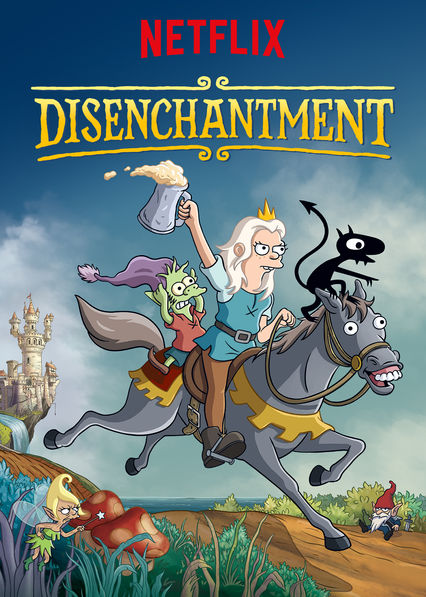
Following an acclaimed run with his ensemble sci-fi comedy Futurama, Simpsons and Life In Hell creator Matt Groening makes a return of sorts to his domestic sitcom roots in a new Netflix series called Disenchantment. The first ten episodes present us with the misadventures of a teenage girl dealing with the peer pressure of friends and parents who don’t understand what she wants.
Now the added twist is that it all takes places in Groening’s “Dreamland”, a crapsack kingdom that’s a blend of various medieval comic tropes (not too far removed from the likes of Monty Python and the Holy Grail) with morbidly satirical takes on fantasy and fairy tale elements. And the result is a biting yet often cute lampoon that shows some good promise in its first season. While there are some kinks in the pacing of the stories that could be altered, there is enough appeal and wit in the cast to keep fans of the Simpsons and much of Groening’s work satisfied.
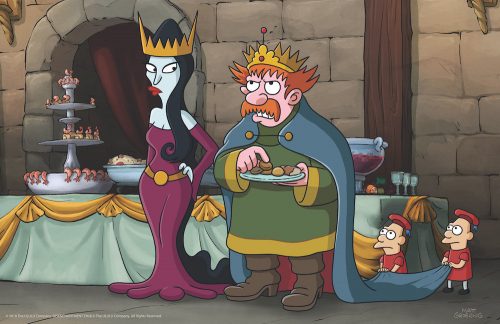
But Princess Bean (Abbi Jacobson) shares no such satisfaction. After her mother Queen Dagmar (Sharon Horgan) was transformed into stone fifteen years ago, she can’t relate to her new stepmother- the lizard-like Queen Oona (Tress MacNellie) that her father, the grouchy King Zog (John DiMaggio, in an appealing performance) remarried. And her half-brother Prince Derek (MacNellie as well) has more in common with Ralph Wiggum than Prince William or Harry. Bored to death with royal trappings, she takes solace in constant drinking, gambling, and generally getting into trouble with a teenage elf named Elfo (Nat Faxon), who’s sick of the conformist rules of his elven village and wants more excitement in his life.
Unknown to much of the main cast, they’re being monitored by The Enchantress (Lucy Montgomery) and her toady Cloyd (Rich Fulcher), who are plotting to overthrow Dreamland. The couple sends a small demon named Luci (Eric Andre) in the hopes of corrupting the fair princess to destroy the kingdom from the inside, but the small devil discovers you can’t steer a train off its tracks when it’s already derailed and tearing up the town.
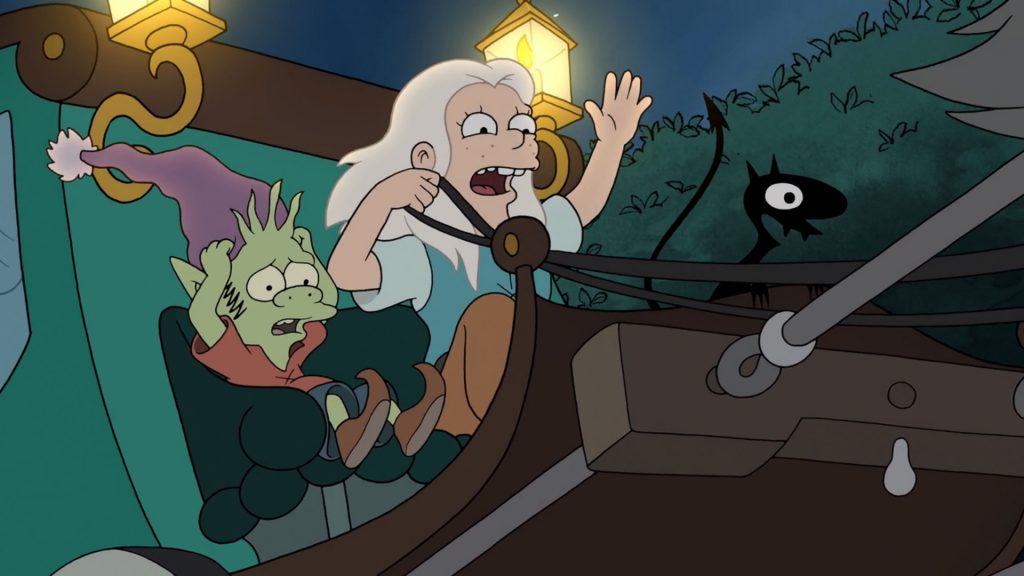
Because as is the tradition with the protagonists in Groening’s shows, Bean has a similar level of irresponsibility as Futurama’s Fry and Homer Simpson, as well as his and Bender’s romance with alcohol- not to mention their love of bizarre schemes to achieve their objectives. The “rebellious princess who’s unladylike and a bit rough” certainly isn’t a concept that’s been left unexplored, but she’s a sharp detour from the brainy and poised Lisa Simpson, or the valiant space captain Leela.
These schemes aren’t limited to throwing a party then defending the castle from Vikings while her father’s away, trying to lure the egotistical Prince Merkimer (Matt Berry) towards an island of seductive mermaids to avoid marrying him (eventually settling on transforming him into a pig), and hooking up Elfo with a giant (misunderstood) woman she believes would be an ideal girlfriend for him after a fib from the elf spirals out of control. But there’s a genuinely kind, dare I say even heroic, person underneath all of the booze and mayhem, believe it or not, and her friendship with Elfo is just plain adorable at points.
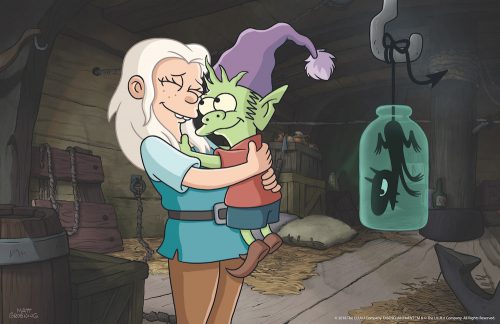
Still, lack of foresight runs on the royal family. Far more concerned with his wizard Sorcerio’s (Billy West) efforts to create an elixir that will grant him immortality, King Zog is far from what I’d call the most enlightened or attentive ruler to his people. His three-eyed prime minister Odval (Maurice LaMarche) tries to offer common sense, but when it comes to Dreamland’s economic development and infrastructure, busting a hole in your wall is the best way to install a new window in your peasant home. But Zog does have a few good character moments later in the first season, where he grows closer towards Bean and we learn more about the kind of prince he was.
On top of being close friends of hers that she’s always loyal to, Luci and Elfo respectively serve as the metaphorical devil and angel on Bean’s shoulders. Unfortunately (or fortunately, for the audience’s amusement), Elfo’s denseness and naivete usually result in the worst decision possible for the trio and anyone in their vicinity.
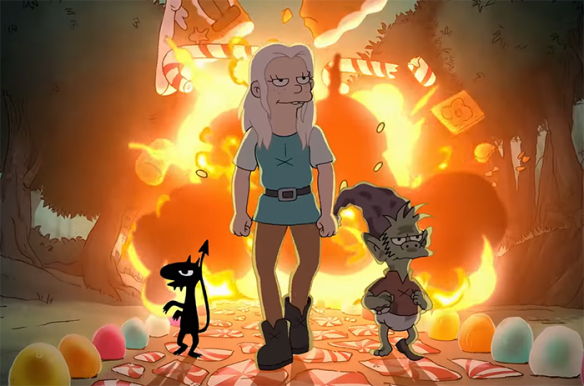
When the show delves deeper into the Enchantress and Cloyd’s plot, the tone of the show becomes notably more serious- not entirely devoid of humor, but the writing becomes more content around episode six to dial back the rapid-fire gags a bit and allow the story to progress more. And while most of the emotional beats are handled well, they don’t quite rise to the intensity of some Simpsons or Futurama tales like “Lisa’s Substitute” or “Jurassic Bark”- not totally flat but not quite as raw as Groening has been with his drama in the past.
Much of the humor still has Mr. Groening’s typical willingness to make his characters and world as hilariously pathetic as possible, with and while it’s not Season Four Simpsons tier, one can still find some decent social satire among Dreamland’s inhabitants- such as the elves’ inability to realize their blatant prejudice, the standings of the various species etc.
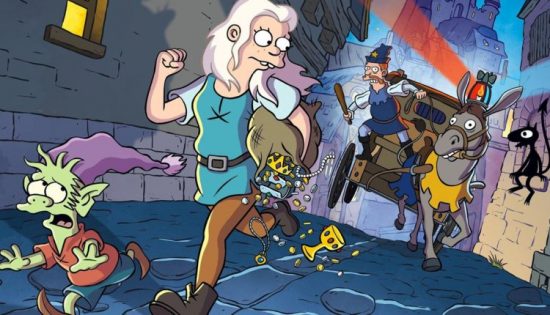
Overall, I feel Disenchantment’s second half was stronger than its first. The more grounded direction it switches towards helped the story a lot, preventing the series from just being a bunch of Simpsons episodes with swords. It has a good opportunity to be some of Groening’s most interesting work in a while, especially for those who have either binged through every Futurama episode already or are starting to find newer Simpsons episodes a bit too routine.
The fact that he’s working with a brand-new cast is a big help in that regard obviously, but so far the hybrid of middle-age and fantasy is allowing for some unique worldbuilding, and Bean is a fun character that forces him and his crew to try different approaches than before. Her cliffhanger at the conclusion of this season is certainly setting itself up for major developments in the upcoming one, as it’s been renewed rather suddenly. I’ll give it a decent recommendation, especially because I think these characters would work amazingly in a Simpsons Arcade-style beat-em-up game.
